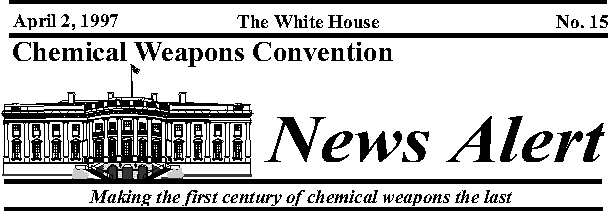The Chemical and Biological Weapons Threat Reduction Act of 1997 (S.495)
introduced by Senator Jon Kyl (R-AZ) March 20 falls far short as an
alternative to the Chemical Weapons Convention.
While S.495 incorporates some elements contained in the CWC and its
implementing legislation, the bill is deficient because it only restricts
the United States, requiring us to go it alone in fighting two of the most
serious threats facing us today -- the spread of weapons of mass destruction
and terrorism. S.495 walks away from a major international agreement,
and takes a �do it yourself� approach. Chemical proliferation and terrorism
are problems the United States must fight in cooperation with other
countries, not alone. The CWC provides such global cooperation.
Only U.S. Elimination of Chemical Weapons. S.495 only requires the
United States to do what it is doing already under existing law signed
by President Reagan -- getting rid of its chemical weapons. The national
security challenge before us is to require other nations to get out of
the chemical weapons business as well. The CWC does exactly this.
Strong U.S. leadership over more than 15 years of negotiations has
succeeded in rallying broad international support for the CWC which outlaws
chemical weapons around the world. One hundred and sixty one countries have
signed the CWC. Seventy have ratified so far. While supporters of S.495 hope that
the rest of the world follows our example and destroys chemical weapons, the CWC requires
other nations to do so.
Limited Trade Controls. In the fight against the spread
of these very dangerous weapons, S.495�s solution is simply to continue to do what
we already are doing -- U.S. export controls and multilateral controls under the
existing, informal �Australia Group.� The CWC allows for the maintenance and strengthening
of the controls already in place, while also formally expanding controls over a broad range
of chemicals and precursors, including new agents, which are not covered by S.495. The
informal Australia Group only consists of 30 countries; the CWC is at 70 countries and
growing. Furthermore, CWC provides for trade restrictions that will go into force April
29 against states who are not party to the treaty.
Only U.S. Sanctions. S.495 provides only for U.S. sanctions against countries that
use chemical weapons (which U.S. law already requires). S.495 tells us
|
to go it alone
in trying to work to obtain international support for multilateral sanctions after having turned our
backs on the CWC. The CWC, while allowing nations to apply their own sanctions, also
requires the parties to the Convention to take the necessary measures to ensure compliance.
These measures could include multilateral sanctions, which are far more effective than
unilateral ones are. The CWC would punish not only chemical weapons use, but the full
range of chemical weapons activity, including production, stockpiling and transfer.
Only U.S. Penalties Against Terrorism. While S.495 incorporates penalties included
in the CWC implementing legislation, the penalties apply only to terrorist activities
in the United States or by U.S. citizens. By contrast, the CWC requires other countries
to punish such activities abroad where the threat is growing. By joining the CWC, the
United States would also benefit from information sharing with other Parties, which could
provide early warning -- an essential component in the fight against terrorism.
Dead-end Diplomatic Approach. S.495 directs the Secretary of State to negotiate an
international agreement which would enforce the 1925 Geneva Protocol against use of chemical
weapons. The international community, following the U.S. lead, has already done this and
more in the CWC. �Ratify the CWC� will be the most certain answer to any Secretary of
State requesting a meeting on enforcement mechanisms against chemical weapons use.
No Relief for Industry. Furthermore, S.495 is incapable of addressing the concerns
of the U.S. chemical industry regarding the trade restrictions that will be automatically
imposed against the United States if it has not ratified by April 29. The industry
estimates potentially $600 million a year in lost sales.
U.S. Leadership Undermined. While sponsors of S.495 claim that their legislation
reinforces U.S. international leadership on chemical weapons, in fact, U.S. leadership
will be undermined if it is intended as an alternative to the CWC. As Former Secretary
of State James Baker III recently stated, �Failure to ratify the Convention would send
a message of American retreat from engagement in the world. For this reason -- and because
our national interest is better served by joining the convention than by lining up with
pariah states outside it -- I support the treaty and urge my fellow Republicans to do
the same.� |


